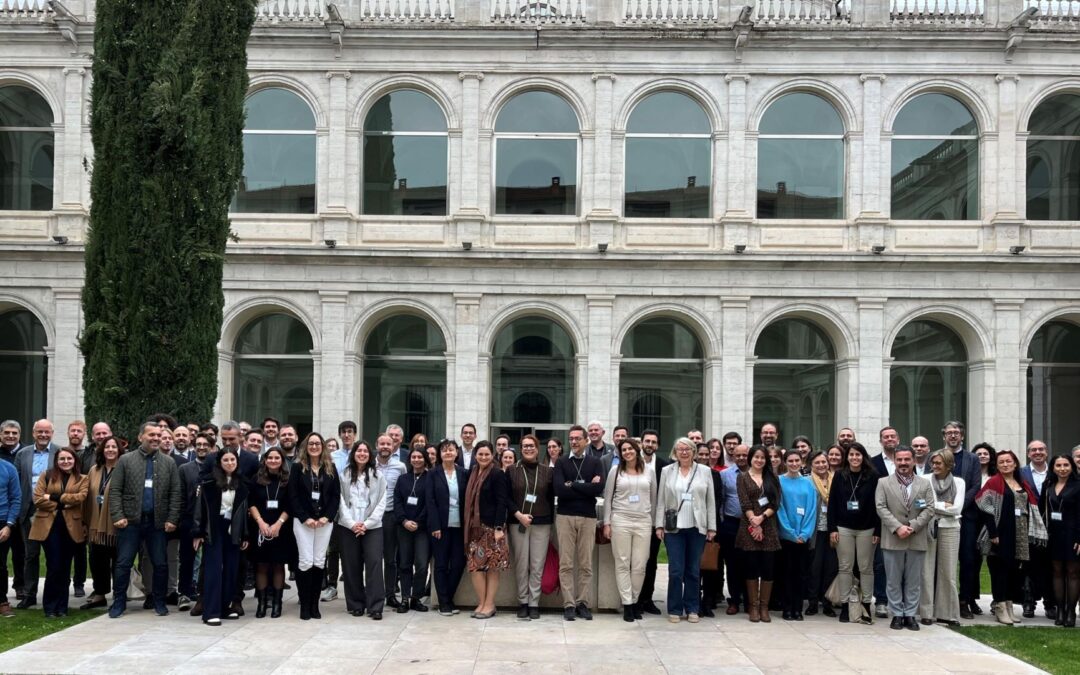The United Circles project consortium met today at the San Agustín Cultural Centre in Valladolid to kick off one of the most ambitious proposals in the field of circular economy in Europe. This project, led by CARTF, arises from the need to reduce the generation of waste through its recovery and reuse in new industrial applications throughout its value chain through an industrial and urban symbiosis.
One of the challenges currently facing society is to reduce the generation of waste at all stages of the value chain of new industrial applications. However, in practice, a number of difficulties arise in aligning the interests of industry, public stakeholders and citizens.
This project seeks to involve local communities in the demonstrators to enable an industry-population relationship that moves towards waste reduction, more efficient use of resources, and thus achieve zero waste cities and a decarbonised local processing industry. Within this framework, Castilla and Leon joins this proposal to reverse the situation through the United Circles project, funded by the European Union within the Horizon Europe programme, with a total of €25,360,000, of which more than €20.5 million is funded by the European framework programme. Likewise, Castilla and Leon obtains an economic return of around 3 million 900 thousand euros from this proposal.
This proposal has three European demonstrators, one of them located in Salamanca, specifically in the Waste Waster Treatment Plant (WWTP), and all three aim to move towards a more circular production system in different areas. Each of these demonstrators will be integrated into a ‘Regional Circularity Hub’ (knowledge and development hub), which will help urban-industrial management and evolution by incorporating financing methods, digital tools and social innovation to make this waste reduction a reality. Each of them wants to demonstrate that:
- In Spain, a wastewater treatment plant can become a resource recovery centre by obtaining nutrients, energy and cellulose in an integrated way.
- In Italy, food waste in the form of used a cooking oil can be recovered in a biorefinery to create new bioplastic products.
- In Turkey, construction and demolition waste from the region can be transformed into a new two-storey 3D printed building using low-carbon recycled materials.
These industrial-urban symbiosis nodes will be expanded over time in a process of duplication and extension to other countries, such as Hungary, South Africa, Greece and the United Kingdom, in what the call ‘mirror demonstrators’. In addition, the organisations within the project, from Slovenia, Lebanon, Austria and France, will promote the possibility of forming ‘seed demonstrators’ to help develop a network of shareholders in order to obtain sufficient investors to start up the ‘Regional Circularity Hub’.
In addition to the coordination tasks, the CARTIF research team involved in this project, belonging to multiple areas of the centre (circular economy, biochemical processes, industry 4.0…) will focus their work on the following areas:
- Experimental work in the laboratory to develop new solutions to close the water cycle (combining electrochemical and membrane technologies), recover cellulose and nutrients from wastewater and valorise it into new secondary raw materials.
- A second experimental work to develop new to develop new waste-to-resource routes between the different demonstrators and thus multiply the possibilities for cooperation.
- The development of a digital system for the management of material and production information in the form of a material catalogue, mapping waste and resources in each region.
- Support in the development of governance mechanisms for the Hubs, defining their mission, vision and objective to facilitate their growth.
The project aims to achieve these general benefits:
- Demonstrate that achieving zero urban waste is prossible in a near-commercial scale environment by recovering resources from waste as secondary raw materials to reduce greenhouse gas (GHG) emissions.
- Reduce freshwater consumption by 50% and reuse 90% of the solid waste from the Salamanca Wastewater Treatment Plant (WWTP).
- Create healthier urban environments through industrial-urban symbiosis, reducing emissions, utilizing circular and renewable energy sources, and minimizing waste.
- Achieve European and international cooperation to meet the goals of the EU’s “Green Deal”.
